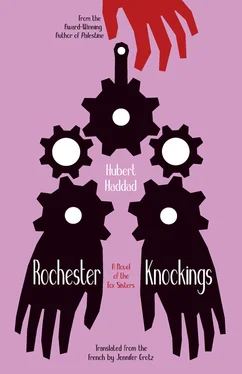“Open the window!” she ordered him. The curtains raised, the full moon inundated the room with metallic clarity. He had helped her lay the old man down on a couch, then unfasten his collar and belt. Several times the hands of the young woman brushed against his. “It’s his heart,” she stated with some hoarseness, wrapping her fingers around the old man’s wrist after having crossed his hands as befits the blind. At this moment, stung with a violent attraction for this woman while being assailed by a vague whiff of decomposition, Pill had still understood nothing of the mixed disorder of his mind and senses.
The wind had picked up on Lake Ontario. William Pill walked along the waterfront where a motley group of porters and sailors bustled between the warehouses and steamships that were docked at the quay. Able to transport at least a thousand barrels, some of the steamships were carrying giant wheels or railroad ties. A little further on, under full sail, a departing frigate reminded him of his eventful journey across the Atlantic and the Plymouth Brethren evangelist, his shipwreck companion who died of cholera on Grosse-Île. The only thing that remained of his adventure was a moldy and dog-eared Bible. It hadn’t been wars or mildew that had caused his departure for America, before the millions of other starving Irish, but a rather pugnacious boy’s dream to put the Ocean between him and his miserable home back then, family included.
Pill headed back toward Sodus Bay, impatient to get back to his cabin on Briscoe Cove where he was not far from leading, on days off, the natural existence prescribed by that good Thoreau, between a canoe for fishing and the leafy forest. “I am in the frightful necessity of being what I am,” that was his motto and his fate. He could have certainly lived there permanently, dressed in skins, a leather belt around his waist, like Elisha the Tishbite. After all, the soul of a swindler could be just as straight as a stalk in water that optical illusion portrays as bent. It was enough to assume if not completely count on one’s redemption. Faith could very well do without the truth.
Sitting on a fence rail, she was waiting for him in front of the stable. Her blonde hair fell in ringlets across her shoulders. Had he ever known, on all the routes he’d traced in the world, a woman more resplendent with vitality, more built to set aside the black scum of mourning and nostalgia? When she had led him away from the blind man, in another room, he still didn’t know her identity and what contract linked her to this bewitched old man. How could he have guessed, even pierced by a dizzying feeling of familiarity, that the pastor, stricken with amaurosis and selective amnesia after a stroke and his only daughter were reenacting the tragedy of Oedipus at Colonus in this Rochester suburb? But the reverend Gascoigne, haunted by his crimes as a holy man, passed away serenely in the arms of this Antigone, without recognizing his Pearl other than by a lightning intuition at the instant of his death.
William Pill dismounted his horse wild with joy and, not stopping to tie the Quarter Horse, ran to lift the young woman into his arms.
“Ah, I’ve missed you like the devil, did you know?”
“The devil has nothing to do with it!” laughed Pearl.
“Neither does the good Lord! Nor any other master of this world or another!”
XV.With the Permission of Frederick Douglass and Ralph Waldo Emerson
Crowds were gathering at the John Street Methodist Church newly rebuilt atop the relics of Wesley Chapel. In the climate of excited nervousness reigning in New York, the overall mix, caused by the disorder of those entering the church and the massive presence of Negroes from Harlem and the Bronx under the vaulted ceilings vibrating with echoes, gave the event an air of revolutionary frenzy. Invited to this forum at the initiative of the American Anti-Slavery Society, Frederick Douglass reconsidered his destiny as a fugitive slave from a tender, as we call it, age, in the plantations of Maryland, when children were prohibited from learning to read, when the slave breakers punished ruthlessly over the least infraction. With a thundering voice he recounted his escape by train and steamer to the enlightened city of New York, thanks to the solidarity of a black sailor from Baltimore and some Quakers from Philadelphia.
Frightened by the unstable crowd at the entrance of the church, Kate listened to him while standing in a sea of shoulders. She had lost Miss Helen, her Irish chaperone, right at the entrance, and all the while her searching eyes marveled at the phenomenon of adhesion caused by this outspoken, aging Negro. She’d happened to cross paths with him in Rochester, where this man they’d nicknamed the Lion of Anacostia had founded the North Star, an abolitionist newspaper. Now she was hearing for the first time this confrontation, by turns affectionate, inflexible and passionate, of an inspired speech with its audience. Even the spirits at such a moment had been subjugated, deprived of any recourse in the face of this power of persuasion. Rightly demanding freedom for each of its citizens in America, but also for women and all the oppressed in the world, Douglass claimed to one day make his dream coincide with reality, without violence, solely by the power of faith. After evoking the Dred Scott decision and Bloody Kansas, he strongly disapproved of the call for armed insurrection by the white radical activist John Brown, all while paying tribute to his inflexible ally.
His equalizing homily ended with an ovation when he formulated once more his credo: “Right is of no sex — Truth is of no color — God is the father of us all, and we are all brethren!”
Jostled toward the exit by the crowd, Kate felt a previously unknown sensation of possibility. This pacifist leader couldn’t be taken in by the agitation spreading across the country, revolts and strikes even in New York. Mr. Greeley, her benefactor, had explained it to her at great length: the Southern States were challenging the authority of the federal government; they were consequently threatening to break accords with the Union, more because of the economic ascendancy of the industrial North than for a simple matter of human rights, whereas the Union vaunted the Constitution as a means to rein in this league of rich landowners, pro-slavery farmers, and illiterate pioneers endangering civil peace. There was a life possible in broad daylight, however, even in the peril of action, and this man who’d survived the worst yokes had come to demonstrate that to her without bragging or mystification. Above all, she felt the freshness of a wind on her cheeks and her neck, like the beating of sails on the bow of a ship. Life was not limited to being confined with the spirits of the dead, in the dark confusion of all those tables, those screens, those walls that she had to constantly probe and question to please the experienced. One could, for several hours or even longer, forget the hereafter, so close and so rustling with omens, for a here and now that was perilous but vast as hope.
At the end of John Street, deep in her thoughts and soon surprised to find herself lost, without even enough to pay for a cab, she watched the blue floats on the East River where the steamers’ smokestacks were sending up plumes. Despite the brisk wind, she would go back to Sutton Place then by foot, where they were waiting for her for who knows what visitor at the home of the director of the New-York Tribune, even if it meant muddying her shoes and the skirts of her dress. Ever since being spared the public séances that often turned into a circus and the challenging consultations in the cabinet with rich neurasthenics, it seemed like she opened herself to a thousand exterior details that yesterday were ominous symbols, like the palpitation of the North Star in the blue of the sky, this cloud in the shape of a schooner figurehead, the play of leaves and birds in a maple tree. A large brunette woman pressing the paws of a fox stole against her mouth passed along the row houses. If it only took Kate a glance to understand what drama she was living, she could free herself from it by humming briskly:
Читать дальше












